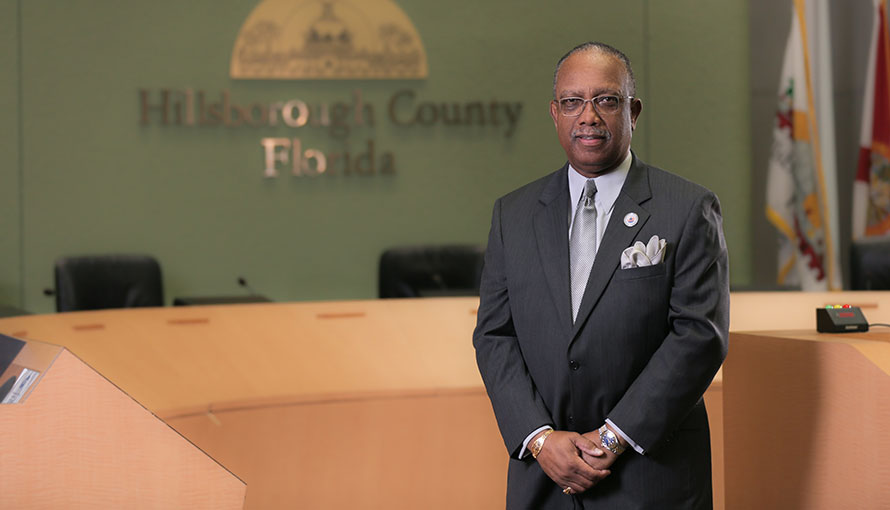A Closer Look at Disparities

Hillsborough County Commissioner Les Miller and his family are some of the faces behind the statistics in the 2019 Annual Report to the Nation on the Status of Cancer. It shows continuing racial and ethnic disparities in cancer mortality and incidence. This is what makes your support of the George Edgecomb Society so critically important.
By Steve Blanchard
Les Miller knows firsthand about cancer’s inordinate burden on the black/African American population.
The long-time member and chairman of the Hillsborough County Commission has tangled with two different cancers in his lifetime: kidney and prostate. His father passed from prostate cancer. Wife Gwen took on breast cancer - twice. Daughter LeJean is currently in treatment at Moffitt Cancer Center for the fifth time, facing down breast cancer, which killed her mother, Cheryl Walker, Miller’s first wife.
Theirs are some of the faces behind the statistics in the 2019 Annual Report to the Nation on the Status of Cancer. It shows continuing racial and ethnic disparities in cancer mortality and incidence.
According to the National Cancer Institute, black/African Americans in general have higher death rates than all other groups for many cancer types. Black/African American men, the NCI found, are more than twice as likely to die of both prostate cancer and stomach cancer compared to white men. While mortality rates as a whole are dropping, black/African American men still experience the highest overall cancer incidence rates. For instance, black/African American men have a higher incidence of lung cancer (and higher death rates from that disease, as well).
Black/African American women, on the other hand, are much more likely than white women to die of breast cancer and that mortality gap is widening as the incidence rate in black/African American women has caught up to that of white women. Black/African American women also have the highest rates of death from cervical cancer.
Overall, black/African American people have a higher colorectal cancer incidence than their white counterparts. Fortunately, the incidence of this disease is declining, but the difference between the two groups remains steady.
The NCI found evidence of progress against cancer health disparities, including reductions in lung and prostate cancer deaths among black/African American men over the past decade. But researchers and public health officials agree that progress has come too slowly, and the cost of disparities — in terms of premature deaths, lost productivity and the impact on communities — remains substantial and must be addressed.
As recognition of cancer health disparities has grown, so have efforts to move beyond simply documenting the problem toward understanding all of its causes and developing and testing interventions to remedy it. Studies suggest that the differences observed in cancer incidence and mortality between various population groups are the result of a complex interplay of genetic, environmental, and social factors.
More clinical trials are needed to address such disparities. The NCI found that the black/African American community is significantly underrepresented in cancer clinical trials.
This is what makes your support of the George Edgecomb Society so critically important. It funds Moffitt research studies to address cancer disparities among the black/African American community, like those highlighted in this newsletter. As many of you are aware, the funding from NIH is very competitive and often limited. This is why your support is so critical. We do not want the lack of funding from NIH to hamper the work that is happening at Moffitt to address health disparities. You can have a direct impact on the continuation of the research in this area.
Recently, an anonymous donor made the single largest cash gift the GES has ever received - $500,000. It will all go toward helping Moffitt researchers study cancer health disparities.
Future columns will spotlight work that Moffitt is doing beyond its research labs to even the playing field when it comes to cancer.
Miller agrees that all of Moffitt’s disparities efforts are important. “Once you’ve had cancer, you realize it’s a disease that has no opinion about your creed, color, national origin, how much money you have,” he notes. “And we need Moffitt to continue to do research and hopefully find a cure.”
George Edgecomb Society
- 2023 George Edgecomb Grant Recipients
- George Edgecomb Society eLetter: February 2024
- George Edgecomb Society eLetter: September 2023
- A Closer Look at Disparities
- Committee Members
- Community Research Updates
- George Edgecomb Society eLetter: February 2023
- George Edgecomb Society eLetter: June 2022
- George Edgecomb Society eLetter: June 2023
- George Edgecomb Society eLetter: March 2022
- George Edgecomb Society eLetter: September 2022
- Speaker’s Bureau
